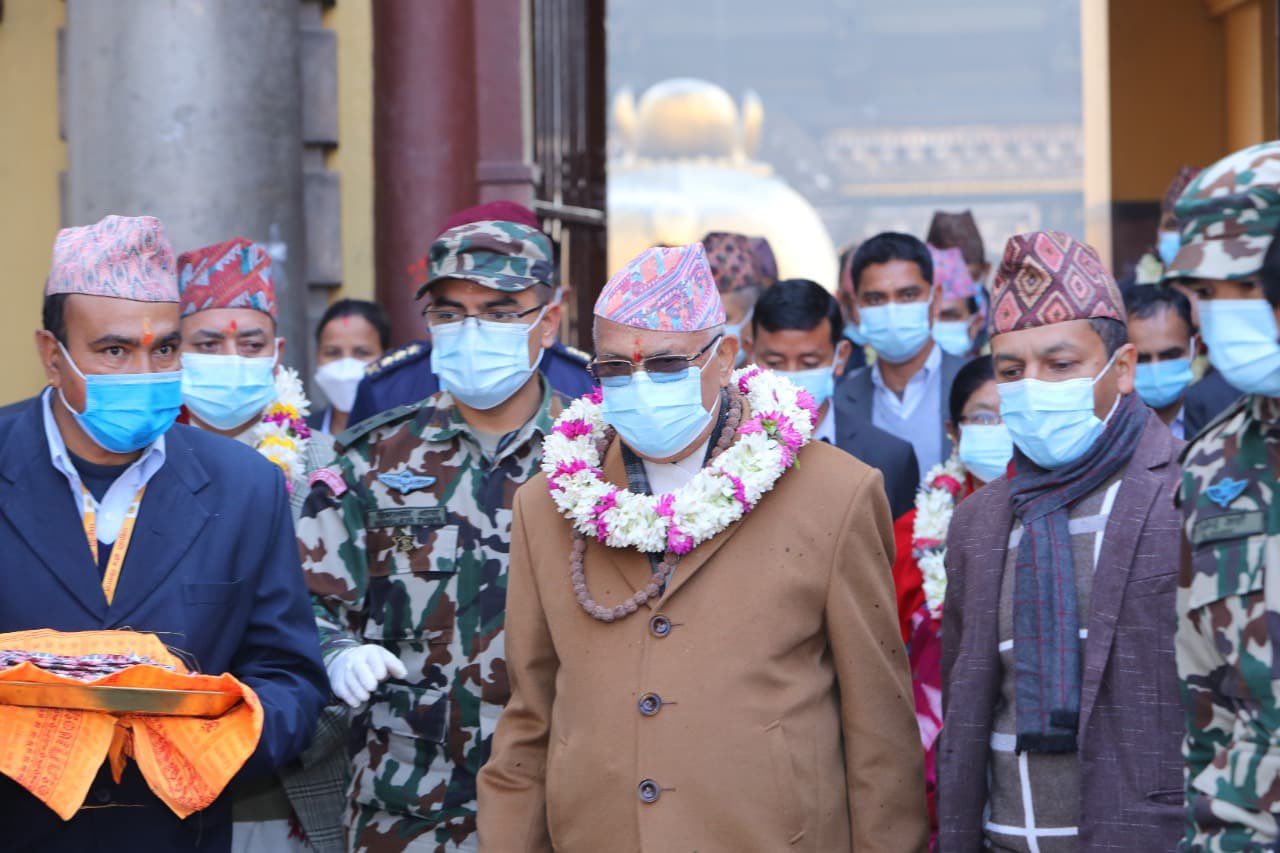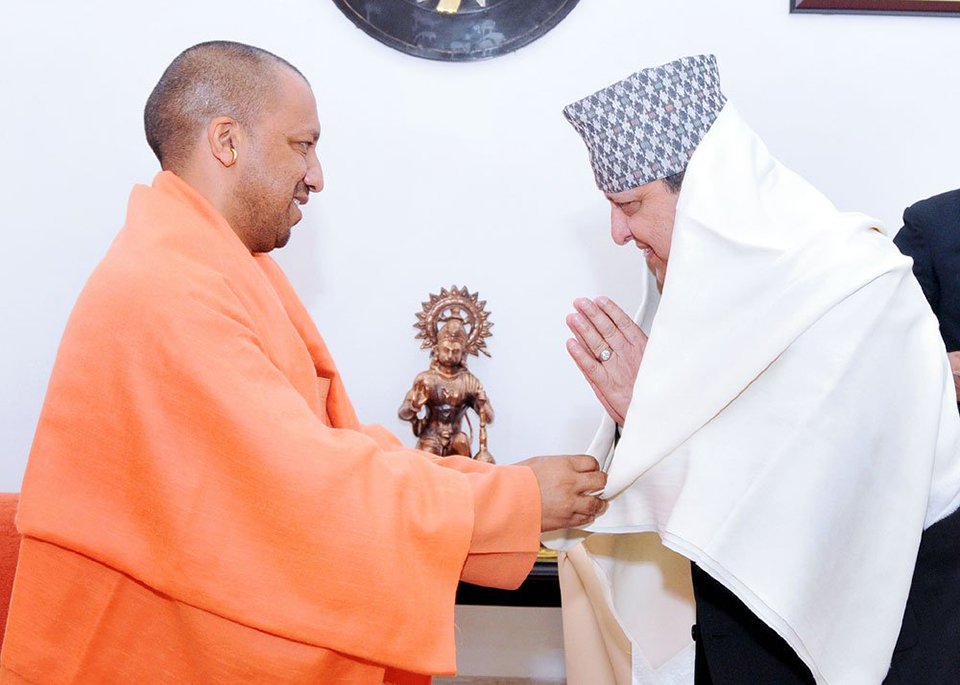During the constitution drafting process, all major parties had agreed to adopt secularism, and mentioned the same in the first draft of the constitution taken to the public to solicit their views.
As the Constituent Assembly (CA) initiated voting on every article of the draft constitution, the pro-monarchist Rastriya Prajatantra Party (RPP) led by Kamal Thapa registered an amendment proposal, urging the House to vote in favor of Hindu state.
But the CA overwhelmingly voted down the proposal and reaffirmed Nepal’s secular status. Of the 601 CA members, only 21 voted in the proposal’s favor. This was a rare occasion when a Nepali parliament had voted on a religious issue.
At that time, RPP was the only political force that was vocally opposed to secularism. But almost seven years on, Thapa and his party are not alone in their bid to restore Nepal’s Hindu state. Some new political forces and sections of major parties are also doing so.
What if this issue is put to a vote? Though unlikely, the call for the restoration of the Hindu state seems to have gained momentum over the past few years. Although the constitution allows a referendum on a matter of national importance, the road to one is not easy; two-thirds of members of Parliament need to back the proposal.
Article 275, which envisages referendums, says, “If a decision is made by a two-thirds majority of the total number of the members of the federal Parliament that it is necessary to hold a referendum concerning any matter of national importance, the decision on that matter may be taken by way of referendum. Matters relating to the referendum and other relevant matters shall be as provided for in the federal law.”
If the Parliament decides to conduct a referendum, the Election Commission shall organize one, according to this constitution and the prevailing federal laws.
 Former Prime Minister KP Sharma Oli performs a special puja at Pashupatinath Temple on 25 January 2021 | RSS
Former Prime Minister KP Sharma Oli performs a special puja at Pashupatinath Temple on 25 January 2021 | RSS
Hindu sentiments are prevalent in major political parties as well. The Nepali Congress as a party remains committed to secularism but there are demands within it for the restoration of the Hindu state. During the 2018 meeting of the Mahasamiti, the party’s second-most powerful decision-making body, over 40 percent of the delegates petitioned party leadership to amend Congress charter to address the issue.
Advocates of the cause within the party argue that people were not consulted on religion during the writing of the constitution. However, that issue never faded. Of the 1,600 party delegates assembled in Kathmandu for the meet, around 700 (over 43 percent) supported a signature campaign to press party leadership to re-establish Hindu state.
Shankar Bhandari, a central working committee member of the party who is leading its Hindu state campaign, says this agenda would be raised prominently during the close-door session of the party’s general convention set to start this week.
Bhandari says almost half of the representatives at the party’s Mahasamiti meeting in 2018 had backed a petition asking the leadership to make restoration of Hindu state an official party position. “We are fully convinced that the party will stand in favor of this proposal during the convention,” says Bhandari.
He says there’s no need to conduct a referendum, but even if one were to be held, people would overwhelmingly vote for a Hindu state.
Also read: What if… the domestic help industry were regulated?
Strong Hindu sentiments have also been observed inside the main opposition CPN-UML. As prime minister, from 2018 to 2021, UML chair KP Sharma Oli took a series of measures to placate Hindu sentiments, including installing a golden ‘jalhari’ at Pashupatinath temple. However, UML leaders and cadres are mostly mum on the matter. The political document endorsed by the party’s Statute Convention held in October fully backs secularism.
Says UML Chief Whip Bishal Bhattarai, even though some party leaders may raise the issue of Hindu state to seek votes, that is a non-starter. “If a referendum is held, the proposal for Hindu state will be easily shot down. Who will vote in its favor? As all parties seem committed to secularism, no amount of force can overturn this,” he says.
Inside the CPN (Maoist Center) led by Pushpa Kamal Dahal such voices are rarer still. There is limited discussion on the issue. Says former Constituent Assembly member and Maoist leader Lucky Sherpa, “some political parties are trying to use religion as a political tool. Yet they are mistaken if they think they can get votes with this agenda.”
The Maoist leader from a marginalized community says that there is no need for a referendum as the constitution has already cemented secularism and religious harmony. “Why should we hold a referendum on an issue that’s already done and dusted with?” she pointedly asks.
On July 26, Rabindra Mishra, a veteran journalist who now leads the Bibeksheel Sajha Party, had proposed dismantling Nepal’s federal structure and holding a referendum on secularism. His proposal attracted fierce criticism from advocates of secularism, both in and outside the party.

The then Sajha Party had, through its national convention held in Lumbini in 2020, unanimously passed a resolution demanding a referendum to decide the fate of secularism. In his political document titled ‘Changing Course: Nation above Notion’ Mishra had argued that in a country with 80 percent Hindus, the result of a referendum is a foregone conclusion in favor of the Hindu state.
“Many surveys have confirmed this. Secondly, if public opinion is not honored in matters like these, there will be a silent fire of dissension ever-present in the minds of the overwhelming majority, which can explode at some point in the form of extremism or ultra-nationalism,” he says.
The RPP, which concluded its general convention recently, has been raising the issue of the Hindu state for over a decade, if without enough public support.
Now that Rajendra Lingden has been elected RPP chair, there are reports that he has strong backing of King Gyanendra. Under Lingden’s leadership, according to party leaders, the Hindu state revival campaign will gain momentum.
Kamal Thapa, who was defeated by Lingden, has publicly accused Nirmal Niwas (King Gyanendra) of orchestrating his defeat.
Speaking after his victory, Lingden said: “There is a huge Nepali mass that wants to revive Hindu state and monarchy. I will connect them to my party. The revival of the monarchy and the Hindu state is my key priority.” There is widespread speculation that Gyanendra wants to revive the RPP to launch the Hindu state campaign.
Also read: Referendum on secularism? 10 public intellectuals weigh in
Then there is the external factor pushing for the revival of the Hindu state in Nepal. Over the past few years, India’s Bharatiya Janata Party (BJP) has been reportedly suggesting Nepal’s political parties to take measures to protect the Hindu religion. As BJP enhances relations with Nepali parties, the Indian Hindu nationalists have been increasingly critical of Nepal’s loss of its Hindu status.
In a meeting with some NC leaders in the first week of October, Yogi Adityanath, chief minister of Uttar Pradesh, reportedly urged the party to strengthen ‘cultural nationalism’. BJP Spokesperson Vijay Sonkar Shastri, who was in Nepal in November, predicted that Nepal would sooner or later become a Hindu state.
Speaking to media persons in Pokhara, he said Nepal was a Hindu nation and it will remain so. “BJP leaders are cautioning their Nepali counterparts to take measures to curtail religious conversions seen under the new secular dispensation,” an NC leader says on the condition of anonymity.
Various Hindu organizations are also pitching for the Hindu state’s revival. Last year, just before the KP Sharma Oli dissolved the Parliament, a series of protests erupted across the country demanding the revival of the monarchy and Hindu state.
Asmita Bhandari, general secretary at World Hindu Federation, is obviously in favor of the Hindu state. However, she has a different take on the referendum. Says Bhandari, Nepal was converted into a secular state through a political decision, so the same method should be applied to revive the Hindu state.
“When the Constituent Assembly endorsed the first draft of the constitution, more than 85 percent people were in favor of a Hindu state. But a report saying so was hidden,” she says.
Also read: What if… the 2015 constitution had been delayed?
Even if a referendum were held, says Bhandari, an overwhelming majority will stand for the Hindu state. “There is no doubt, 80 percent of people are in favor of a Hindu state,” says Bhandari.
In a public opinion poll conducted earlier this year by Sharecast Initiative Nepal, a NGO, 51.7 percent respondents—slightly down from a 15-year average of 60 percent—said Nepal should be declared a Hindu state, 40.3 percent said they are okay with secularism, while 8.1 percent respondents withheld their views. According to the survey, the support for Hindu state, at around 70 percent, is the highest in province no. 2.
As Pitambar Bhandari, Assistant Professor at the Department of Conflict, Peace and Development Studies of Tribhuvan University, sees it, the Hindu sentiment has risen somewhat in the past few years.
According to him, the biggest reason is political parties’ failure to properly manage the political system established by the new constitution.
Additionally, for many people, “advocating for a Hindu state has become a medium of expressing their dissatisfaction, which is precisely why some political leaders want to milk the agenda,” says Bhandari.












